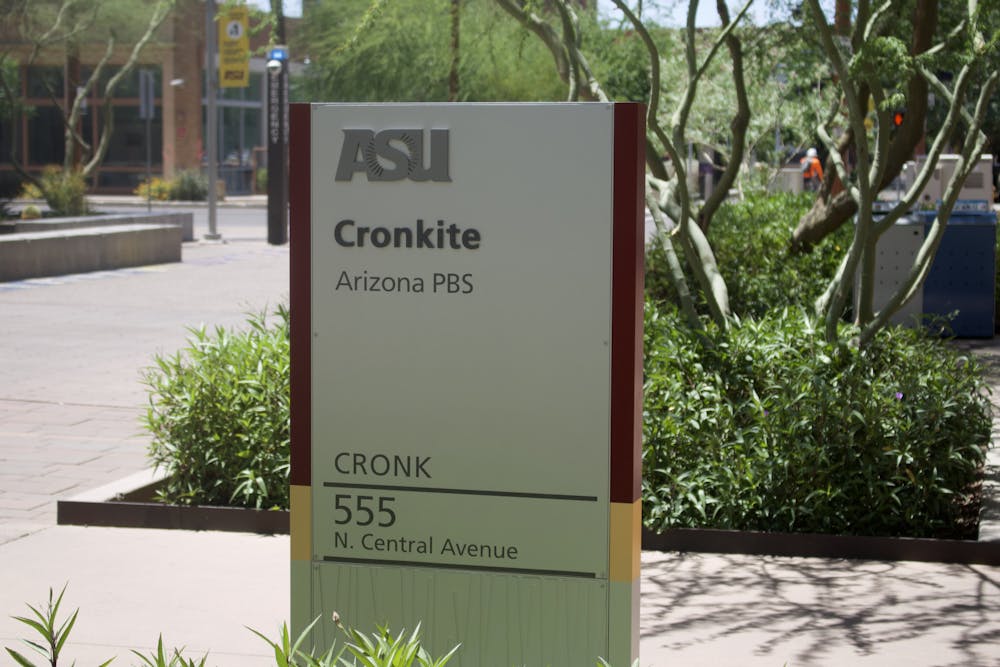As President Donald Trump seeks to cut funding to public media sources, Arizona PBS is defending the value of its services while looking for alternatives to federal support.
Trump signed an executive order on May 1 to end the "taxpayer subsidization of biased media." This action instructs the Corporation for Public Broadcasting to end direct funding to PBS and NPR and decline to provide them with future funds.
ASU operates the local PBS member station, Arizona PBS. While the University does not provide any funds to the station, it does provide HR support, some utilities and offices located in the Walter Cronkite School of Journalism and Mass Communication, said Scott Woelfel, the general manager of Arizona PBS.
Jeremy Cauthen, the senior director of brand engagement and marketing at the local station, said in a written statement that Arizona PBS employs 37 student workers, and "a large portion of them are Cronkite students." Woelfel said there are around 75 full-time staff members in addition to those students.
The executive order called federal funding for PBS and NPR "corrosive to the appearance of journalistic independence," and stated that "neither entity presents a fair, accurate, or unbiased portrayal of current events to taxpaying citizens."
Woelfel disagreed with that assessment as it pertains to PBS.
"On the national front, PBS is recognized as not only one of the most respected and trusted media organizations in the country, as almost completely unbiased," Woelfel said. He added that many of the local issues Arizona PBS covers have nothing to do with partisan politics.
Cooper Hancock, a senior studying sports journalism and a digital content creator for Arizona PBS, said hearing the decision to cut public media funding is going to come with "disdain and disgust."
Hancock said attacks on journalism and accusations of "fake news" have unfairly hurt the industry as a whole. He also said public media organizations are among the best news sources.
"NPR is one of the best places you can go to learn everything and … get firsthand information from different people around the world," Hancock said. "And that's the news source that's being defunded, and that's the one that's being shot down and slandered by the leader of our country."
Beyond mere news production, advocates say Arizona PBS provides critical services that would be impacted by the executive order.
Woelfel said Arizona PBS provides early childhood education resources, and its broadcast signal provides remote parts of the state with emergency communications like wildfire alerts.
Those services cost each taxpayer around $1.60 every year, Woelfel said. But in total, federal grants from the Corporation for Public Broadcasting make up about 12% to 13% of the station's annual budget.
"It's a very efficient investment by the federal government in vital services that would simply go away if it (federal funding) didn't exist," Woelfel said.
Talia Liszka, a senior studying journalism and mass communication and an intern at the station, said she grew up watching PBS Kids.
"'Sesame Street' was my thing," Liszka said. "Seeing that it would not be there for children that are growing up now in this generation, it really makes me sad."
Liszka said low-income households will particularly suffer from the potential loss of accessible educational programming,
Woelfel said the station also runs educational summer camps and steps in to fill the gap for Arizona children who don't attend organized preschools throughout the state.
Positions for student workers like Hancock and Liszka may also be at risk, Woelfel said.
Although Hancock said he isn't too worried about his own position, which is hybrid and emphasizes social media, he said downsizing at the station could affect other students' career paths.
"If 12 or 13% of our budget goes away, then you have to make some really hard choices on what you retain," Woelfel said.
The remainder of the Arizona PBS budget comes from individual and corporate donors, independent foundations and state and local grants, Woelfel said.
"The positive news is we have a lot of different sources of funding," Woelfel said. He added that the station was already pursuing non-federal sources to prepare for this situation and to raise more money.
Liszka said eschewing federal funding might be a more stable option for Arizona PBS; however, the amount of money the federal government provides for the station is likely significant enough to necessitate their aid.
At the national level, litigation is seeking to reverse the executive order. Both NPR and PBS sued the Trump administration in late May.
Liszka said the situation with federal funding is "nerve-wracking," but she is still excited to work at the outlet, as are many other students.
"I have high hopes," Liszka said. "We have a great team at PBS, and I know that somehow we are going to find a way to work through this."
On Saturday, June 14, 2025, at 9:21, a graph was added to include recent developments in legislation regarding public media.
On Thursday Jun. 10, the U.S. House of Representatives passed the bill which would lead to PBS and NPR funding cuts. This bill, which was inspired by DOGE cuts, is now being sent to the Senate where it will be voted on in the coming weeks.
Edited by Katrina Michalak, Leah Mesquita and Pippa Fung.
Reach the reporter at coyer1@asu.edu and follow @carstenoyer on X.
Like The State Press on Facebook and follow @statepress on X.
Carsten Oyer is a sophomore studying journalism and mass communication, as well as public service and public policy. This is his second semester with The State Press, having previously worked as a politics reporter.




